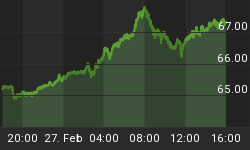The condition of the U.S. Dollar is perhaps one of the least thoroughly reported on topics in the press today. Sure, you will read the daily article rehashing a load of ambiguous language uttered by some central banker or government official. And you may even come across the occasional news story of how a particular currency's movement has affected an industry such as tourism or textiles. But what you will never read about is the vicious clandestine battle being waged by various governments and interest groups around the world.
Because the U.S. Dollar acts as the world's reserve currency, any sudden drop or rise in its value creates winners and losers. And if the status quo (in terms of the Dollar's value) is achieved, yet another list of winners and losers is produced. This is why politicians and government officials would prefer to downplay the issue altogether - no need to make new enemies. That being said, the Dollar's drop over the last few years is slowly creeping into the national debate. What is fascinating about the topic of the Dollar is how the issue cuts across party & international lines and creates a series of strange alliances.
While farmers, manufacturing companies and exporters have traditionally lobbied for a weak Dollar, labor unions have started to echo this sentiment as they see manufacturing jobs shifted to less developed nations. Politicians in textile-producing districts have been quite vocal when it comes to the issue of China revaluing their currency. The theory is that a stronger Yuan (ergo a weaker Dollar) will make the environment between Chinese laborers and American factory workers more competitive. However, this argument is flawed because anything short of a six-sigma revaluation would do nothing more than make a tiny dent in China's competitive advantage where labor costs run at a fraction of the cost of the U.S. work force. Moreover the Chinese government does not want to see its unemployment rate shoot up, especially since there are so many unemployed migrants as it is. So the bottom line is that the Chinese Communist Party will continue tolerating commodity price inflation (as a result of its artificially low Dollar peg) rather than face waves of angry unemployed citizens.
Aligned with the anti-weak-Dollar Chinese are the Europeans, importers such as Wal-Mart, and creditors including large money center banks. Any Dollar depreciation against Asian currencies means higher prices for Wal-Mart which would hurt sales and margins. Continued Dollar depreciation against the Euro makes European exports less competitive. Hearing a European government official complain about the Dollar is more common today than ever. Finally, the large money center banks on Wall St. are overwhelmingly in favor of a strong Dollar. These banks are creditors and the last thing they would like to see are their loans being paid back in weaker Dollars. More importantly, a Dollar crisis would spell trouble for U.S. assets including corporate bonds and equities. And any softening of demand for Wall St.'s securities must be avoided at all costs in their eyes.
One last constituency who has a major stake in the future of the Dollar is the average Joe Six Pack. But his position is contradictory. On one hand, being the over-consumer that he is, Joe loves a strong Dollar because he can buy his plasma screen television at a good price. And because the strong-Dollar environment has created low interest rates over the last decade, Joe can finance his new purchase at rock-bottom rates. On the other hand, Joe is in debt up to his eyeballs and doesn't know how he'll ever be able to pay off his credit cards. Dollar weakness would help inflate Joe's debt away over the coming years with minimal pain.
So who will win and who will lose? Warren Buffett, one of our investing heroes, has just come out with his most recent annual letter where more than two full pages are devoted to warning his readers about America's alarming trade deficit. He points out that the "force-feeding of American wealth to the rest of the world is now proceeding at the rate of $1.8bn daily" and that America's trade policies are turning it into future a "sharecropper's society". Buffet, who blames both political parties for our current situation, has made a large bet against the U.S. Dollar ($21.4 billion in foreign exchange contracts at year-end spread among 12 different currencies). It's hard to argue with a man who has $40 billion reasons to think he is right. Over the long run, we agree that absent large changes in trade policies, the U.S. Dollar is toast.















